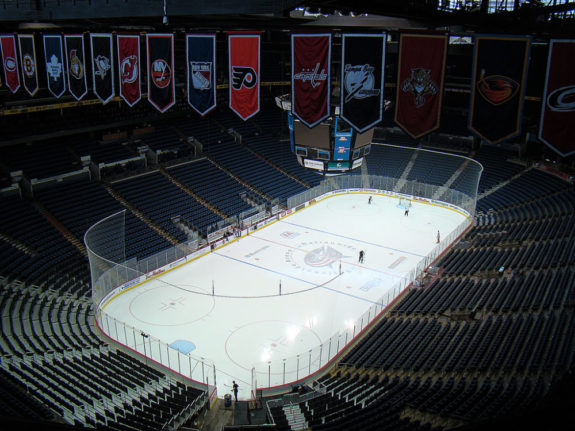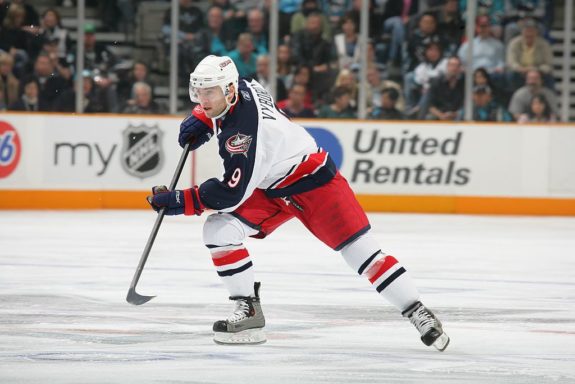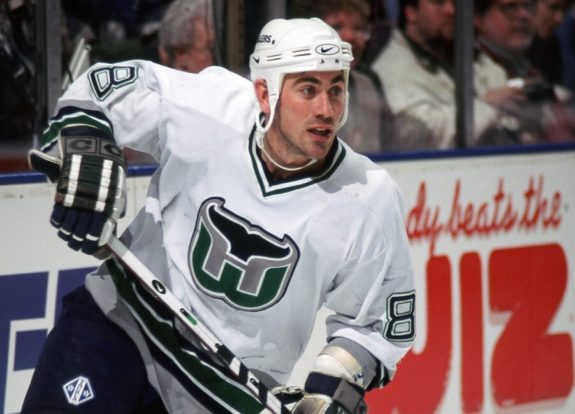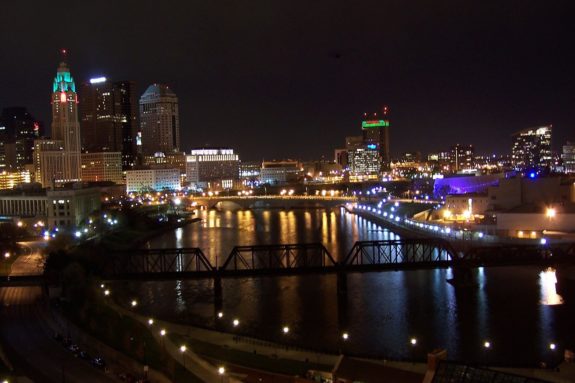Since the establishment of the Columbus Blue Jackets, they have been in search of success. While the fans got a taste of success in the 2019 Stanley Cup Playoffs, success has been elusive for the organization. In this article the beginnings of the franchise, where the franchise stands now, and what the team has meant for the city of Columbus off the ice will be explored.
The Beginning of the Blue Jackets
Columbus began the process of getting an NHL franchise on Nov. 1, 1996, when an application was submitted by a group of five investors called Columbus Hockey Limited, along with the $100,000 application fee.
Related: The Good & the Bad – The Columbus Blue Jackets Unders GM Scott Howson
The biggest obstacle was the arena since, without an arena, there would be no team. NHL Commissioner Gary Bettman was told by city officials when he visited Columbus that they would not pay for an arena. A referendum for public funding was voted down. However, after the levy was voted down, Nationwide Insurance pledged $150 million in financing for an arena.

After Nationwide announced they would finance an arena, Columbus was granted an NHL expansion franchise on June 25, 1997. Construction on Nationwide Arena began on May 26, 1998, and it opened on Sept. 9, 2000.
Shortly after the announcement, the franchise, along with Wendy’s Restaurants, held a contest to name the team. They received 14,000 entries, and with the help of the NHL, narrowed the names down to ten. In November, team officials announced that Columbus’ team would be called the Blue Jackets to honor Ohio and Columbus’ Civil War heritage and support of the Union Army.
The Blue Jackets’ First Game
The franchise played their first game in Nationwide Arena on Oct. 7, 2000, against the Chicago Blackhawks in front of a near-sellout crowd of 18,136 fans.
Related: Origins of Every NHL Team – Eastern Conference
At the 7:34 mark of the first period, the Blue Jackets scored their first franchise goal, scored by Bruce Gardiner with assists from Krzysztof Oliwa and Kevyn Adams. They had a 3-0 lead by the end of the first period with goals from David Vyborny and Steve Heinze.

Even though the team started fast, it went downhill in the second period. The Blackhawks scored five unanswered goals, including two each from Reto Von Arx and Tony Amonte. The Blue Jackets dropped their first game as a franchise in a 5-3 loss. They were undisciplined, racking up seven penalties, and their goaltending struggled. Goaltender Ron Tugnutt finished with a .800 save percentage (SV%).
A Summary of the Inaugural Blue Jackets Season
The Blue Jackets won their first game on Oct. 12, 2000, against the Calgary Flames. They then won their first home game on Oct. 27 against the Washington Capitals. Mostly, they struggled, finishing with a record of 28-39-9-6 (71 points) and in last place in the Central Division.
The leading scorer on the team in 2000-01 was Geoff Sanderson, who finished the season with 30 goals and 56 points. He was the first 30-goal scorer in franchise history, and also recorded the team’s first hat trick on Feb. 10, 2001, against the Nashville Predators. The defense was led by Jamie Heward, who had 27 points. Tugnutt finished the season with a .917 SV%, a 2.44 goals-against average, and four shutouts.

The Blue Jackets’ early struggles set the team on a bad trajectory toward the Dave King and Doug MacLean era. However, they still had an average attendance of 17,457, which ranked 12th in the NHL, an indication of the city’s loyalty to their hockey team that would last.
The Blue Jackets’ Long Path to Success
Compared to other expansion teams, the Blue Jackets have struggled as a franchise to find success. Examples include the Minnesota Wild and Vegas Golden Knights. The Wild joined the NHL in the same season as the Blue Jackets and found playoff success in only their third season, when they made it to the Western Conference Final. Vegas had success early on as well, reaching the Stanley Cup Final in their first season as a franchise.

In the first 15 years of the Blue Jackets’ existence, all they had to show were two wins (both in overtime) in the postseason in only two appearances. Those appearances included the 2008-09 season when they were swept by the Detroit Red Wings in the first round and a first-round loss to the Pittsburgh Penguins (2-4) in the 2013-14 season.
Related: NHL Hat Tricks History & Fun Facts
Through the struggles, the fans have kept patience and hope. That finally paid off on October 21, 2015, when the club fired Todd Richards and hired head coach John Tortorella. In just five years he has led the team to the playoffs or a play-in round four times. The franchise has also won nine playoff games in the Tortorella Era, compared to two in the first 15 years. They included sweeping the Presidents’ Trophy-winning Tampa Bay Lightning in the 2019 Stanley Cup Playoffs, their first-ever playoff series win.
The Blue Jackets Bring Much More Than Hockey to Columbus
The Blue Jackets have brought much more to the community than hockey. The financial impact has been the most noticeable. There was a 2009 report done by the John Glenn School of Public Affairs at Ohio State University on the economic impact of the team and arena in Columbus. From 2000 to 2009 the team and Nationwide Arena brought in over $2 billion to the city.
It also states that $850 million of spending in Columbus could be attributed to the team and arena, as well as $160 million in indirect spending at restaurants and hotels from fans from out of town. Over $1 billion in investments have been made or pledged to the Arena District in Columbus, an area that was home to 172 businesses, 7000 jobs, and $6.13 billion in sales revenue. All of which were also from 2000-2009.

The team hasn’t only made an economic impact in Columbus, but a charitable one as well. The Columbus Blue Jackets Foundation has donated nearly $11.4 million to promote the health and wellness of Central Ohio children since 2000. The team’s non-profit footprint doesn’t stop there. Many members of the organization make individual efforts to better the community, such as Nick Foligno and Tortorella.
Foligno founded a non-profit in his mother’s name to end breast cancer and has raised a total of $750,000. Tortorella and his wife Christine run a non-profit called the Tortorella Family Foundation that supports multiple causes including education enrichment opportunities for children and medical care for those in need.
The creation of the Blue Jackets has created a tight-knit community of fans in the city. Many groups of great fans have been created over the years. One of the most well known may be the CBJ Artillery, the original creators of the “We Are the 5th Line” movement in 2014 which has now become a well-known moniker for Blue Jacket fans everywhere. Many other groups exist as well such as the Union Blue Soldiers and the Jacket Backers. The team has brought together a great community of fans looking for the organization’s next big accomplishment.
Conclusion
The Blue Jackets’ arrival in Columbus and quest for success has turned into a movement in Columbus. The team wants to advance their community, whether it be pushing it economically or by providing support for wellness and education. The team has also been able to bring a city of great fans together. The franchise has pushed for success on and off the ice, especially off of the ice. As the Blue Jackets find success and grow on the ice, the city and community will continue to prosper with them.